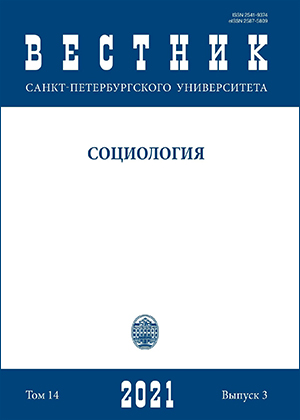Professional success of Russian web developers in foreign and local freelance marketplaces
DOI:
https://doi.org/10.21638/spbu12.2021.303Abstract
With the growth of the digital gig economy, which was accelerated during the COVID-19 pandemic, competition between freelancers in online labor markets has intensified — successful performers are those who are more competitive on a global level. The aim of the current article is to assess the global competitiveness of Russian freelance programmers as representatives of new flexible forms of employment in online labor markets through indicators of objective professional success. The objectives of the study include assessment and description of the professional success determinants, which relate to freelancers from foreign and Russian online labor markets. The work is based on the results of an empirical study. The data of freelancers’ profiles, which was extracted by web scraping, revealed that the professional success of Russian web developers was heterogeneous and depended on specialization and the type of labor exchange. A tremendous proportion of Russian freelance programmers possess a local, however, not global competitive advantage. Foreign freelancers operate with more sophisticated technologies, position themselves actively as experts, and tend to work at lower remuneration. Only a small group of Russian web developers have succeeded internationally due to a high quality of services, advanced human and social capital — in-depth education, knowledge of foreign languages, proficiency in web development technologies, and participation in professional communities. Russian freelancers in local online marketplaces are less successful in terms of financial indicators. Their promotion is based not on the competition of skills, but on payments made by freelancers themselves. Their minor interest in advanced web technologies and foreign languages will hardly contribute to involvement in global labor processes. A new group of technocrats, capable of initiating innovative processes in the economy and social life, has been gradually emerging; for greater expansion of into global labor markets, the development of human and social capital is necessary.
Keywords:
career success, freelance programmers, freelance marketplaces, platform economy, online labor markets
Downloads
References
References
Downloads
Published
How to Cite
Issue
Section
License
Articles of "Vestnik of Saint Petersburg University. Sociology" are open access distributed under the terms of the License Agreement with Saint Petersburg State University, which permits to the authors unrestricted distribution and self-archiving free of charge.




